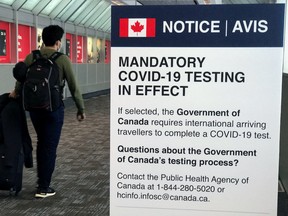Two-thirds of Canadians ready to drop COVID-19 restrictions
Closing schools and airport arrivals testing are the restrictions that should be eliminated first, say respondents

Article content
Two-thirds of Canadians believe it’s time to drop COVID-19 restrictions and begin living with the virus, according to a new poll.
The survey, conducted by Maru Public Opinion for Postmedia, revealed that 64 per cent of respondents believe that unless hospitals and intensive care units are affected by a sudden surge of COVID-19 patients that compromises the care of other people, governments should lift pandemic restrictions.
Respondents living in Quebec (71 per cent), Alberta (65 per cent) and Ontario (65 per cent) were found to be the most likely to hold this view. Those who are least likely reside in British Columbia (48 per cent), Manitoba and Saskatchewan (41 per cent), and Atlantic Canada (39 per cent).
John Wright, executive vice president of Maru Public Opinion, said that there is a general understanding that Canadians want fewer restrictions. He said considering the last six months of polling, nothing is surprising about this.
“There is a recognition that COVID is going to become a part of our lives,” he said. “As a result, people want things to start to open up and make decisions based on their own cognizance.”
According to the poll, 56 per cent of Canadians say the unvaccinated should not be pressured into getting the shot. The majority believe that if someone has not gotten it by now, they won’t, and pressuring them is creating backlash that is “worse than living with them in our communities.”
On the topic of who precautions should be determined by, 53 per cent of respondents believe that it should be left up to them to choose what measures they take to protect themselves and not the government or health-care officials. This view is held by the majority in Alberta (62 per cent) and Quebec (62 per cent) and the minority in British Columbia (41 per cent) and Atlantic Canada (44 per cent).
That being said, the poll found that 45 per cent of Canadians believe that now is the time for chief medical officers and health officials to stand back.
While most people are ready for strict mandates to be lifted, Wright said that they are also open to having certain restrictions imposed depending on the impact on their local health-care systems. He said that people are open to having medical personnel ready to pull them back, should they need to.
The survey of 1,506 Canadian adults who are Maru Voice Canada panelists was conducted on Feb. 9. A comparable probability sample of this size has an estimated margin of error of plus or minus 2.5 per cent, 19 times out of 20.
As provinces begin to announce their plans to move towards a life with fewer COVID restrictions, epidemiologists suggest that some mandates should go before others.
Prabhat Jha, professor of global health and epidemiology at the University of Toronto and executive director of the Centre for Global Health Research at Unity Health Toronto, said the response to COVID has to depend on the level of community transmission and hospitalization. As we see improvements, he said it would be a good idea to think about lifting or reducing restrictions.
There are some restrictions that Jha said should be lifted first, such as arrival testing at airports, which he said did not help limit the spread of variants, and closing schools, which he said has been proven to not drive down the rate of community transmission.
He also said the use of vaccine passports must be debated as the definition of “fully vaccinated” is not clear. If governments want to prevent transmission, then it needs to be three doses, said Jha. If they want to keep people out of the hospital, then two.
“Two-dose vaccine passports aren’t very useful,” he said. “So, they would probably have to be phased out.”
Most epidemiologists agree that some mandates should stick around.
Timothy Sly, professor emeritus of epidemiology at Ryerson University, said that vaccines and masking requirements should remain as top priorities. He said both getting vaccinated and wearing a mask are the best ways of preventing COVID-19.
Also, testing and isolation when positive is “hugely important,” said Jha, because you do not want to infect others.
As Canada moves towards treating COVID-19 as an endemic, and living with the virus, Sly said we will have to get used to living differently. What this means, we do not know yet, but he said wearing masks in crowded indoor areas and showing proof of vaccination or negative tests may become the norm.
“Releasing all of the precautions too soon is something we would probably regret enormously,” said Sly. “We must do it carefully and driven by data.”
Our website is the place for the latest breaking news, exclusive scoops, longreads and provocative commentary. Please bookmark nationalpost.com and sign up for our newsletters here.













Postmedia is committed to maintaining a lively but civil forum for discussion. Please keep comments relevant and respectful. Comments may take up to an hour to appear on the site. You will receive an email if there is a reply to your comment, an update to a thread you follow or if a user you follow comments. Visit our Community Guidelines for more information.